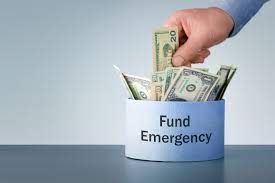Last updated Mar. 11, 2023 by Peter Jakes
Overspending is one of the quickest ways to find oneself in a difficult financial position if it is allowed to continue unchecked. The unfortunate reality is that in today’s world, falling into this dreadful pattern is becoming easier and simpler to do.
However, what if excessive spending is really a symptom of a more fundamental issue? And what if you were able to put a complete halt to your pattern of unnecessary spending if you addressed the fundamental cause of the problem?
In the following paragraphs, I will discuss the seven primary factors that lead to excessive spending, as well as the specific steps that may be taken to address these issues.
Continue reading this article if you are prepared to rein in your spending and regain control of your life’s finances, and if you feel ready to do so.
How to Conquer 10 Causes of overspending
Here we will talk about how to Conquer 10 causes of overspending. These are following
1. Not Living Within Your Means
Simply said, trying to manage your finances without a budget is one of the most frequent reasons people overspend. It is all too simple to veer off course — or lead your financial life down a perilous route if you don’t have a clearly defined strategy for your money, much like going on a road trip without a map.
Therefore, setting up a budget should be your first step to curb your spending habit. And I’m not referring to a general budget where you divide your funds into three categories. Instead, you should budget your money down to the last cent by listing every dollar of revenue and cost you anticipate incurring each month. Additionally, be sure to include investing, saving, and donating.
2. Lack of Financial Motivation
The lack of compelling motivation behind many people’s financial choices is another frequent cause of overspending.
Your “why” often referred to as this, is a crucial component of being financially successful. Finding an even stronger reason NOT to spend money is thus one of the greatest methods to overcome your temptation to do so. And by powerful, I mean.
What if, for instance, your financial goal is to provide your family with financial stability and freedom? Then you will have to persuade yourself that spending money on something you don’t need is more essential than on your family every time you contemplate doing so.
But it goes further than that! Your financial goal can be to accumulate enough funds to travel without limitation. Or maybe your goal is to save enough money to leave your miserable work and follow your dream profession.
3. An attempt to win over others
Comparing yourself to others, or even worse, attempting to impress others, is one of the greatest pitfalls you may fall into when it comes to personal finance.
Trying to please others nearly always results in overspending, whether you wind up financing a vehicle you can’t afford to purchase outright, maxing up your credit cards on clothing, or taking on a mortgage that consumes your salary.
The worst aspect is that you can be impressing someone who is also attempting to impress you with their money! It’s a terrible cycle, and we’re all guilty of it, to be honest.
4. Credit Card Spending

One of the things I’ve learned is that accumulating money is made easier the simpler your financial life is.
For instance, if you have less debt, you will have more money to save and invest since you would have fewer monthly payments to make. Similarly, the fewer amounts you have to handle and the lower your risk of late payments and overspending are, the less money you spend on credit cards.
5. Idleness
Have you ever found yourself idly browsing your favorite online retailer’s inventory because you have nothing better to do? You are not alone, however. Boredom is another significant factor that contributes to expenditures, and most individuals aren’t even aware of this factor’s potential severity until it is brought to their attention.
Unfortunately, it is one of the most difficult factors of spending too much to eliminate. Because avoiding boredom takes a surprising amount of self-control and effort. You must also be really proactive and purposeful.
The greatest piece of advice I can offer you is to identify the circumstances in your life that cause you to become bored and attempt to fill them with a more productive habit.
For instance, if you become the most bored in the evenings, you may locate a workout partner and go to the gym after work every day. Alternatively, you may establish a side company or work a part-time job to occupy your free time.
Simply said, occupying your time with useful activities is a terrific strategy to improve your financial situation if boredom is one of the reasons you overspend.
6. Excitation
I have to deliberately practice patience every single day. It’s difficult for me to practice patience, whether it’s saving up money to make a purchase or accepting the time it will take me to reach my financial objectives. I am aware that I am far more likely to make a poor financial choice when I am irritated.
And if you have trouble controlling your expenditures, impatience could be the true problem. Consider the following: If you want to buy a vehicle, you essentially have two choices: either you can save up the funds and pay in cash, which may take months, or you can finance the automobile and leave the lot in a matter of hours.
7. Spending on emotions
Emotional spending is the seventh and last factor on our list of causes of excessive spending. You may not even be aware of how big of an impact your emotions have on your buying habits, much as when you splurge because you’re bored.
Assessing whether or not a certain feeling prompts you to spend money is crucial if you want to stop spending too much. Emotional spending, whether it be when you’re happy, upset, or even thrilled, may cause severe issues in your financial life.
8. Wait a Few Days
Consider your purchases for a day or two before making them rather than buying them on the spot. This provides you the opportunity to consider if you truly need the item before committing to buying it.
Even better, please put it in writing and postpone the purchase until the next month. You may then include the necessary funds for your purchase in your monthly budget.
One of the most effective methods to avoid spending too much money is to give your buying selections more time simply.
9. Don’t Spend Emotionally
As a means to cope with stress, people often turn to excessive spending. It’s not a fantastic justification to say that you deserve those beautiful earrings since you’re having a difficult day.
Instead of shopping when you are exhausted, hungry, worried, etc., shop when you are feeling emotionally high. Never go shopping after you’ve had a terrible day or when you think you deserve it. More than a brand-new pair of shoes, you deserve financial independence.
10. Use Debit
Debit cards are a terrific way to assist you to avoid overspending. Only the amount that is available in your checking or savings account may be spent using a debit card. If you just have $5, that’s all you can spend.
It will be easier for you to say “no” to certain unneeded purchases if you keep track of the immediate effect. Fortunately, Chime, award-winning mobile banking software and debit card, is available. It is made specifically to assist you in saving money. Chime offers tools like daily balance alerts and Automatic Savings to help you manage your money and save.
Psychological reasons for overspending

One of the many possible reasons why individuals spend more money than they should is because they are trying to boost their own mood.
This is only one of the many reasons why people spend more money than they should. Some people have likened the feeling they receive to that of a temporary high they had in the past.
If you experience symptoms of mania or hypomania, it’s conceivable that you’ll spend more money than usual or make reckless decisions about your finances. Both of these outcomes are feasible.
How to control spending habits
We may all agree that we have to eat, but that does not mean that it has to be so damned costly. Take a moment to think about the most recent meal you ordered.
After adding in the cost of delivery, the tacos were not only icy cold but also mushy and expensive. However, despite the fact that the epidemic has inspired many individuals to cook more meals at home, it has also increased our need for takeaway and delivery.
If you find this is one of your weak spots, you may reduce the amount you spend on food by making some simple adjustments. Plan and budget for every dollar you spend. Share your current financial predicament not just with your loved ones and family but also with your creditors.
Make it more difficult for yourself to spend your money, Make your own meal plans and prepare them, Make prudent use of whatever “extra” money you get, and if you find yourself in a financial bind, seek assistance.
How to not spend money for a week
Come up with your very own version of the Come Dine With Me event this week and get together with some pals. Choose the dishes that seem the most appealing to you, and then organize a get-together with your friends to try to recreate them.
Spend some of your free time watching anything on Netflix, Amazon Prime, NOW TV, or one of the other streaming services.
You are aware that you do not need to purchase a ticket to enter a movie theater in order to see a movie, but if you organize your evening appropriately, you can have just as much pleasure watching a movie at home as you would in the theater.
Getting in shape is not only a National Health Service effort. Inspiration may be found everywhere since the fitness industry is one of the most rapidly expanding business areas in the UK. If you have a subscription to a fitness center, this is the week to put your membership to good use.
How to stop spending money on unnecessary things
You have arrived at the correct location if you are seeking recommendations on how to cut down on your spending of money.
The following eight tried-and-true strategies can assist you in avoiding unnecessary expenditures of money.
There are several approaches to creating a budget and sticking to it, but the Cash-Only Budget is one of our favorites because of how straightforward it is and how effective it is.
Organizing one’s meals in advance is an excellent strategy to save costs. Buying exactly the amount of food that is required for the week’s meals can help you avoid going over budget for groceries.
People have a tendency to squander or live above their means for a variety of reasons, and one of the most common of these causes is boredom. It is never a waste of time to educate yourself on new ways to save money while you are searching fruitlessly for the most effective methods currently available.
Frequently Asked Questions
1. What are the causes of overspending?
- Not on a tight budget
- Trying to manage your finances without a budget
- Lack of financial direction
- Trying to impress others.
- Boredom, impatience, emotional spending
- And credit card use.
2. What is the most common form of overspending?
According to experts, peer pressure, boredom, marketing offers, credit cards, and disregarding little costs might cause you to go over your budget. Your budget will always suffer if you indulge in excessive spending.
3. How do you stop overspending people?
to Cut Back on Spending Use a projection strategy for your retirement funds. Organize your purchasing with a list, reflect on why you are pursuing the objective, Pay with cash rather than a card and Observe your weekly savings deposits.
4. What are the effects of overspending?
Your financial health may suffer if you develop the habit of overspending and living above your means. This may lead to A debt cycle that may be hard to escape owing to interest owed. a situation when it is difficult to save for retirement while attempting to stay up.
5. what is overspending?
When you overspend, you go beyond what you can comfortably afford. Don’t splurge on your house if you want to recoup the costs later on.
6. What are the causes of overspending?
A debt cycle that may be hard to escape owing to the interest owed. A situation when it is difficult to save for retirement while attempting to stay up.
7. How do I break my overspending habit?
Use a retirement savings projection strategy, Organize your purchasing with a list, reflect on why you are pursuing the objective, and Pay using cash rather than a card. Keep track of your weekly savings contributions and choose a no-early-withdrawal savings account.
8. How do you discipline spending habits?\
Setting short-, mid-, and long-term financial objectives, creating a budget, paying off debt, establishing an emergency fund, reducing spending, developing smart investing strategies, and working with a financial planner are just a few methods to exercise financial discipline.
Summary
Keep in mind that responsible spending will pave the way for you to achieve your financial goals. Your financial future will be much more hopeful if you can break the habit of spending more money than you have available as soon as you can.
In most cases, excessive spending is really a symptom of a more significant issue. There are a lot of different causes that might lead to it, like not living on a budget, not having a financial purpose, and even just being bored with life.
In addition, addressing the fundamental problem by devoting some of your time to the endeavor might turn out to be one of the finest decisions you ever make about the state of your finances.







